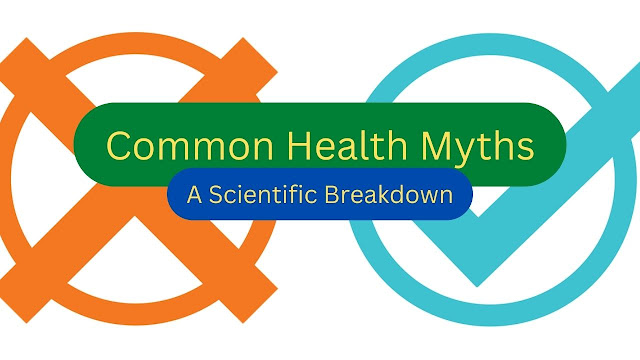Debunking Common Health Myths: A Scientific Breakdown
There are many health myths that have been circulating for years, despite being debunked by scientific research. These myths can be confusing and can lead to misconceptions about what is healthy and what is not. In this article, we will take a closer look at some of these myths and provide the scientific evidence to debunk them.
Myth 1: Eating gluten-free foods are healthier
Gluten is a protein found in wheat, barley, and rye. Some people have a gluten intolerance, known as celiac disease, which can cause damage to the small intestine. For these individuals, a gluten-free diet is necessary. However, for most people, eating gluten-free foods is not healthier and can even lead to a lack of essential nutrients.
A study published in the Journal of the Academy of Nutrition and Dietetics found that individuals on a gluten-free diet had a lower intake of fiber, iron, and other essential nutrients. Another study published in the Journal of Human Nutrition and Dietetics found that gluten-free products were often higher in calories, fat, and sugar compared to their gluten-containing counterparts.
Myth 2: Eating fat makes you fat
For decades, people have been told to avoid fats in their diets because they are high in calories and can lead to weight gain. Fat is a necessary macronutrient for the body and can actually aid in weight loss when consumed in moderation. The key is to choose healthy fats, such as those found in nuts, seeds, and avocados, rather than saturated fats found in processed foods.
A study published in the Journal of Lipid Research found that a diet high in monounsaturated fats, such as those found in nuts and avocados, was associated with a lower risk of weight gain. Another study published in the International Journal of Obesity found that a diet high in monounsaturated fats was more effective in reducing body weight and body fat compared to a low-fat diet.
Other recent research has shown that not all fats are created equal. Some fats, like the monounsaturated and polyunsaturated fats found in nuts, seeds, and fatty fish, can actually have a beneficial effect on heart health and weight management. It's important to be aware of the types of fats you are consuming and to focus on incorporating healthy fats into your diet, rather than completely eliminating fats.
Myth 3: Antibiotics cure viral infections
Antibiotics only work against bacterial infections and are useless against viral infections such as the cold or flu. Taking antibiotics when they are not needed can lead to antibiotic resistance, making them less effective when they are needed.
The World Health Organization (WHO) states that "taking antibiotics when they are not needed increases your risk of getting an infection later that resists antibiotic treatment." Additionally, the Centers for Disease Control and Prevention (CDC) states that "about 1 in 3 antibiotic prescriptions are unnecessary."
Myth 4: Vaccines are dangerous and can cause autism
This claim has been thoroughly debunked by multiple studies and has been discredited by organizations such as the Centers for Disease Control and Prevention (CDC) and the World Health Organization (WHO).
A study published in the Journal of the American Medical Association (JAMA) found no association between the measles-mumps-rubella (MMR) vaccine and autism. Another study published in the New England Journal of Medicine also found no link between the MMR vaccine and autism. Vaccines have been proven to be safe and effective in preventing the spread of deadly diseases. The idea that vaccines can cause autism is based on a 1998 study that has since been thoroughly discredited and retracted by the journal that published it. Subsequent studies have consistently shown no link between vaccines and autism. Vaccines are thoroughly tested for safety and efficacy before they are approved for use, and they are continually monitored for potential side effects.
Myth 5: You should avoid eating at night to lose weight
Many people believe that eating at night will cause weight gain because the body is less active and therefore less able to burn off the calories consumed. However, research has shown that the timing of meals has little effect on weight loss or gain. What matters most is the overall balance of calories consumed versus calories burned. Eating a healthy, balanced diet and getting regular exercise is the key to weight loss, regardless of whether the meals are consumed during the day or at night.
Myth 6: You should drink eight glasses of water a day
The "8x8 rule" (drinking eight 8-ounce glasses of water per day) is a commonly cited guideline for daily water intake, but there is no scientific evidence to support it. The amount of water a person needs can vary depending on factors such as activity level, climate, and overall health. A more accurate way to determine your own water needs is to listen to your body and drink when you feel thirsty.
Myth 7: Cracking your knuckles causes arthritis
Cracking your knuckles is a habit that many people have, but it is often met with warnings that it will cause arthritis. However, there is no scientific evidence to support this claim. In fact, a study published in the journal Arthritis Care & Research found that people who crack their knuckles have no greater risk of developing arthritis than those who do not. This cracking sound is caused by the release of gas bubbles in the joints, and it is not harmful to the body.
Myth 8: Organic food is always more nutritious
Organic food is grown without the use of synthetic pesticides and fertilizers, and is often considered to be healthier and more nutritious than conventional food. However, a review of studies published in the Annals of Internal Medicine found that there is little difference in the nutritional content of organic and conventional foods. While organic food may be free from certain chemicals, it is not necessarily more nutritious. The most important thing is to eat a variety of fruits, vegetables, and whole grains, regardless of whether they are organic or not.
Myth 9: Antibacterial soap is better than regular soap
Antibacterial soap contains chemicals that are designed to kill bacteria, but there is little evidence to support the claim that it is more effective than regular soap in preventing the spread of germs. In fact, the use of antibacterial soap may contribute to the development of antibiotic-resistant bacteria. The Centers for Disease Control and Prevention (CDC) recommends using plain soap and water to wash your hands, and only using alcohol-based hand sanitizers when soap and water are not available.
Myth 10: You can "catch" a cold from being cold
Many people believe that being cold can cause you to "catch" a cold, but this is not the case. Colds are caused by viruses, not by exposure to cold temperatures. However, being cold can make you more susceptible to infection by lowering your immunity and making it easier for viruses to take hold. To protect yourself from colds, it is important to practice good hygiene, eat a healthy diet, and get plenty of rest.








.jpg)



.jpg)

.png)
0 Comments